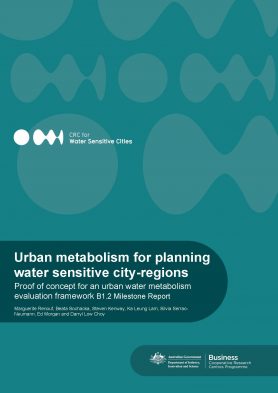Urban metabolism for planning water sensitive city-regions Proof of concept for an urban water metabolism evaluation framework
Researchers from The University of Queensland’s Water-Energy-Carbon Research Group and Griffith University’s Urban Research Program further developed and used the concept of urban metabolism to evaluate the water resource management at city-region and meso-urban scales.
Urban metabolism is a concept which considers the flows of resources into, through and out of urban settlements. At its simplest, metabolism focusses on mass balances of water and materials and related energy flows. However, metabolism can also be used to understand how ecosystems or organisms function, with the intent of guiding us towards the higher resource efficiencies of natural systems. We are interested specifically in the urban metabolism of water. The aim of the research was to develop an evaluation framework that can generate indicators and knowledge of urban water metabolism to inform urban and regional planning.
The research is part of Project B1.2 of the Cooperative Research Centre for Water Sensitive Cities’ Program on Water Sensitive Urbanism. This report describes the second phase of the urban metabolism component of Project B1.2 (Figure 1). The first phase developed the concept for the Urban Metabolism Evaluation Framework for Water (UMEF4Water) (Renouf et al., 2016). In this second phase, the framework was applied to a sample of Australian city-regions (macro-urban scale) to test that the information generated can inform urban and regional planning towards more ‘water sensitive cities’.
This report summarises the research outcomes to demonstrate achievement of Milestone 2. Further details of the research have been published in Farooqui et al. (2016), Renouf et al. (2017), Renouf et al. (submitted), Serrao-Neumann et al. (in press), Serrao-Neumann et al. (2017), King et al. (2015), and Lamb (2016).
